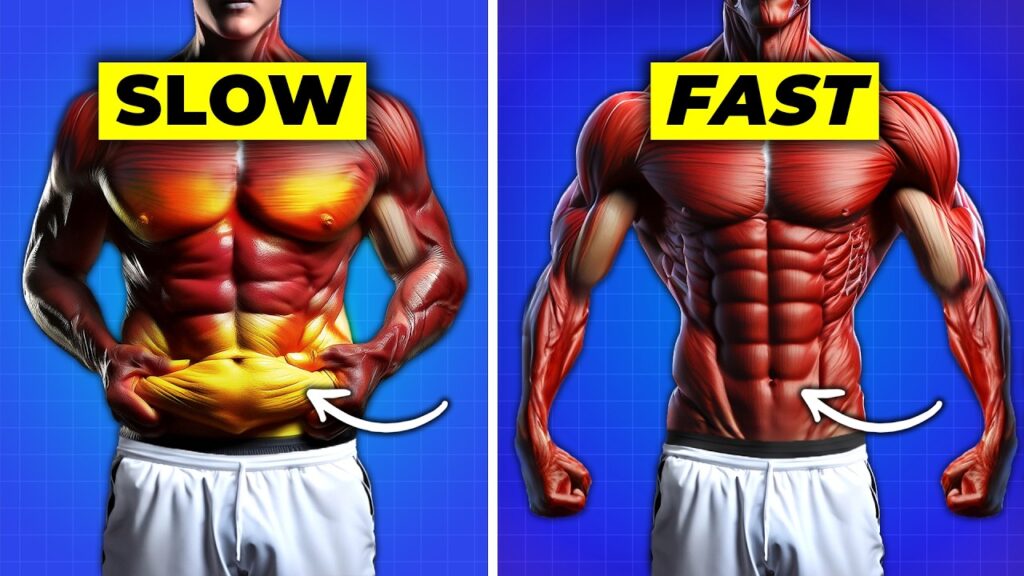Boosting your metabolism is crucial for fat loss and overall health. Understanding the process of metabolism, how it converts food into energy, and how it impacts vital body functions is key to achieving your weight loss goals. By incorporating resistance training, HIIT, quality protein, a balanced diet, hydration, quality sleep, stress management, and meal timing into your lifestyle, you can effectively boost your metabolism for fat loss and improve your overall well-being.
In addition to lifestyle changes, incorporating thermogenic foods, supplements, and understanding the role of hormones in metabolism can further enhance your weight loss journey. Remember that everyone’s response to food and exercise is unique, so it’s important to find what works best for you to optimize your metabolism and achieve your fitness goals. By implementing these strategies and debunking metabolism myths, you can take control of your health and achieve sustainable weight loss.

Importance of Metabolism
Metabolism plays a significant role in impacting fat loss and overall health. When metabolism is boosted, it can aid in shedding unwanted body fat and improving energy levels, mood, mental clarity, and even muscle growth.
Various vital body functions such as breathing, digestion, circulation, cell growth, hormone regulation, and body temperature regulation are influenced by metabolism. Without optimal metabolism, these functions may not operate efficiently, leading to potential health issues.
Effective Strategies for Boosting Metabolism
Boosting metabolism can be achieved through various effective strategies that have proven to be beneficial for overall health and weight management.
Resistance Training
Engaging in resistance training not only helps in building muscle mass but also contributes to boosting metabolism. Resistance training impacts metabolism through Excess Post-Exercise Oxygen Consumption (EPOC), which leads to increased energy expenditure even after the workout.
HIIT Workouts
High-Intensity Interval Training (HIIT) is another effective method for boosting metabolism. Studies have shown that both HIIT and resistance training result in similar EPOC values, leading to burning more calories in a 24-hour period compared to steady-state aerobic training.
Eating Good Quality Protein
Consuming good quality protein-rich foods can increase the number of calories burned at rest. Protein has the most thermogenic properties among macronutrients, requiring more energy for digestion and absorption, thereby boosting metabolism.
Balanced Diet
Maintaining a balanced diet that includes proteins, carbohydrates, and fats is essential for optimizing metabolism. Each macronutrient plays a crucial role in energy production and nutrient absorption, contributing to overall metabolic health.
Hydration Importance
Staying hydrated is vital for metabolism and overall health. Water is essential for various bodily functions, including regulating body temperature, transporting nutrients, and ensuring proper organ function.
Quality Sleep and Stress Management
Quality sleep and effective stress management are crucial for weight management and metabolism. Lack of sleep and chronic stress can negatively impact metabolism, leading to difficulties in losing weight and maintaining overall health.
Meal Timing and Frequency
The timing and frequency of meals can also impact metabolic health. Eating regular, balanced meals throughout the day can help maintain a steady metabolic rate and prevent energy crashes.
Intermittent Fasting
Intermittent fasting is a dietary approach that can improve metabolic flexibility and aid in weight loss. By alternating between periods of fasting and eating, the body becomes more efficient in utilizing stored energy and burning fat.
Thermogenic Foods and Supplements
Consuming thermogenic foods and supplements can further boost metabolism and aid in fat burning. Ingredients like capsaicin in chili peppers, green tea, coffee, ginger, turmeric, and Garcinia Cambogia have been shown to have thermogenic properties that enhance metabolic rate.
Lifestyle Factors for Improved Metabolism
Incorporating active lifestyle choices, such as regular exercise and healthy eating habits, can significantly improve metabolism. Being mindful of lifestyle factors can lead to long-term benefits for overall health and weight management.
Resistance Training for Metabolism Boost
Resistance training offers numerous benefits beyond building muscle mass. By engaging in weight-bearing exercises, individuals can increase muscle protein synthesis, which gradually boosts metabolic rate, leading to greater caloric expenditure at rest.
Benefits of Resistance Training
Resistance training helps in building muscle mass, enhancing strength, and improving metabolic rate. The stress placed on muscles during resistance exercises prompts the body to increase muscle protein synthesis, thereby boosting metabolism.
Resistance Training Techniques for Metabolism Boost
Incorporating various resistance training techniques, such as weight lifting, bodyweight exercises, and resistance bands, can effectively enhance metabolism. Varying the intensity and volume of resistance exercises can further optimize metabolic benefits.
HIIT for Boosting Metabolism
High-Intensity Interval Training (HIIT) has gained popularity for its ability to boost metabolism and promote fat loss. By performing short bursts of intense exercise followed by brief rest periods, individuals can significantly increase their metabolic rate.
Benefits of HIIT
HIIT workouts are effective in burning calories, improving cardiovascular fitness, and increasing metabolic rate. The intensity of HIIT exercises leads to an elevated calorie burn even after the workout, contributing to overall weight management.
HIIT Workout Structure for Metabolism Boost
Structuring HIIT workouts with alternating periods of high-intensity exercise and recovery intervals can maximize metabolic benefits. Including a variety of exercises and intensities in a HIIT routine can help in boosting metabolism and improving overall fitness levels.

Dietary Impact on Metabolism
The food we consume plays a crucial role in influencing metabolic rate and overall health. By making conscious dietary choices, individuals can enhance their metabolism and support weight management goals.
Eating Protein for Increased Calorie Burn
Protein-rich foods require more energy to be processed by the body, leading to increased calorie burn. Including good quality protein sources in meals can boost metabolism and support muscle growth and repair.
Balanced Diet Components for Metabolism
A balanced diet that includes proteins, carbohydrates, and fats is essential for optimizing metabolism. Each macronutrient serves a unique purpose in energy production and nutrient absorption, contributing to overall metabolic health.
Importance of Hydration for Metabolism
Staying…
(Word count: 931)
